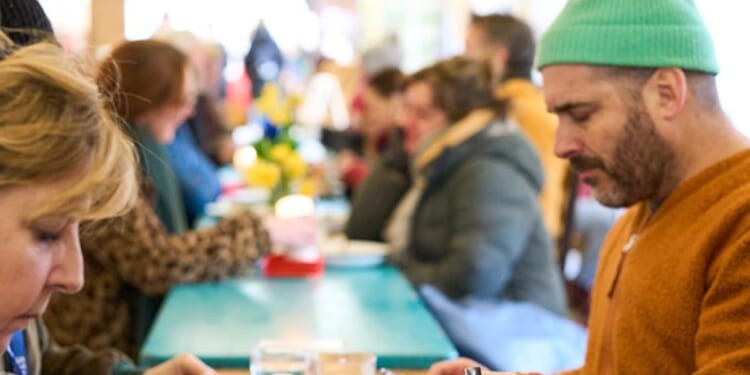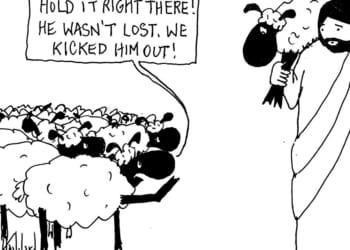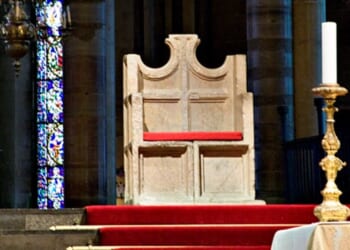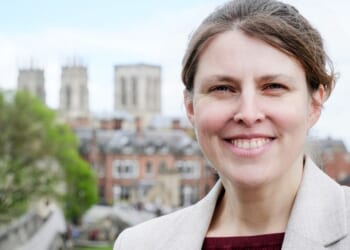A REMARKABLE new restaurant, The Long Table, opened last November in Cirencester’s historic Market Place. You can enjoy a generous bowlful of “hyper-local”, nutritious, and very tasty food there for £10 or so. You can pay double that if you want to. Or, if you ask at the till for “a meal for Tom”, you can pay nothing at all.
Seating at the long refectory tables is unreserved, and conversations with strangers are encouraged.
The Long Table was devised by Tom Herbert, a fifth-generation baker best known since 2012 as one half of Channel 4’s “Fabulous Baker Brothers”. When he was in his late thirties, he had a series of culinary adventures overseas, working with Tearfund in Laos and the favelas of Brazil, and then trialling a micro-bakery on the streets of Nairobi.
This started him, he says, on “a journey of learning how the thing that I’m passionate about — food and cooking and people eating together — can create life-changing opportunities for people”.
His favourite word is “companion”, which comes from the Latin for “with bread”, he explains. A question began to haunt him: What if everyone had access to good food and people to eat it with?
In 2018, he rang Will Mansell, an acquaintance who had gathered a number of social enterprises in Stroud under the umbrella of his “modern-day secular monastery” the Grace Network, to ask how he could get involved
“I already had on my heart the idea of The Long Table,” he recalls. The name is derived from the saying: “When you have all you need, build a longer table, not a higher fence.”
Mr Herbert says that the restaurant’s success, in its first iteration in Brimscombe, Stroud, and now in in Cirencester, has amazed him. “It has the whiff of utopia about it. It hasn’t always worked, but it’s worked well enough. It has always felt like it’s worth the risk.”
One of his fellow directors, William North, explains how the “pay-as-you-can” model works. “People want to know a price, so we advertise what it costs us to create the meal. If today we say that a meal costs £10.25, say, that includes food costs, staff costs, fixed costs, tax — but not any profit.”
In Brimscombe, on average, 40-45 per cent of customers who come in off the street pay less than the advertised price. A similar percentage pay more: “it might be £15, or they might ‘pay a meal forward’.”
In Cirencester, the numbers are turning out to be very similar. Perhaps one in five comes with less than £3, and one in ten asks for “a meal for Tom”.
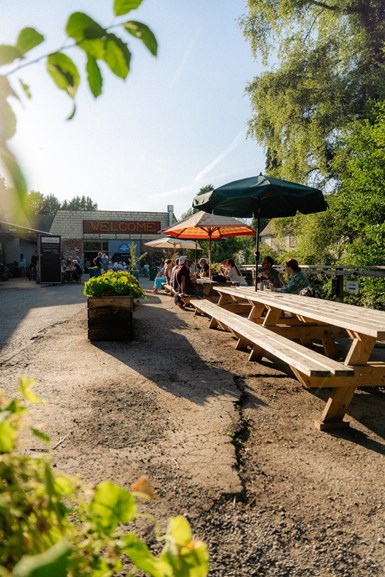 Some of The Long Table’s outdoor seating at Brimscombe Mill, Stroud
Some of The Long Table’s outdoor seating at Brimscombe Mill, Stroud
“The hardest thing to do is to give things away,” Mr North says. “What we do exceptionally well is to make it really welcoming for anyone to come.”
Mr Herbert cites the example of one loyal regular, a man in his late sixties who pays 50p for his meal while he tries to get his life back together. “He does what he can and we do what we can. Having talked with him at the table, we were there when he got an unfurnished flat. and through our furniture business we were able to cobble some things together for him.
“It’s not about charity: it’s about dignity, equality, and a community supporting neighbours who need a little help.”
The two sites between them are now serving more than 5500 meals a month. The shortfall in revenue is largely made up by the Friends of the Long Table, who are invited to sign up at £25 or £35 a month “or another amount that works for you”. There are more than 400 Friends in Stroud, and more than 40 in Cirencester.
The latest slogan for The Long Table is “Amazing things happen when we eat together.” Mr Herbert tells the story of a woman, Laura. “She found it really difficult to walk. She would sit at the table and the team would bring her a meal — which isn’t how it usually works, but we look out for each other.”
One lunchtime, she found herself sitting opposite Claire, a local osteopath, who asked her about her walking stick. Laura explained her condition, and Claire said: “I’ve treated people with that and seen them walking again.”
Laura said that she couldn’t afford treatment: she was homeless at the time, and her life was in a really bad way. Claire suggested that she copy the Long Table model and “pay as you can”.
The upshot of that meeting is that Laura is now walking again. “But they also became great friends,” Mr Herbert says. “They’ve been on holiday together, and they come in every Tuesday and play table tennis.
“We see examples like that all the time. Sometimes, when the finances are challenging, it’s those things that encourage us to keep on.”
AT THE start, Mr Herbert says: “It felt hugely ambitious. If The Long Table works, perhaps this is something we could do opposite every McDonalds in the world. But I’ve been humbled by circumstances.”
The first major setback came in 2021. “We had been working super-hard during lockdown,” he explains. “We had worked with nine kitchens from different organisations to cook and freeze meals, and distribute them around Gloucestershire. We’d offered ‘pay-as-you-can’ takeaways in every hospital in the county.”
The operation ballooned, he says, and his first teammate at The Long Table, Emma Hurrell, had a GWR train named after her. But, just as that was happening, they were evicted from their original home in Brimscombe Port, where the Grace Network paid a peppercorn rent, so that the local council could redevelop the site for housing.
The local community rallied round, and the Grace Network was able to move all its businesses into the derelict Brimscombe Mill. “It had no roof, no windows, no electricity, no water. We had to rebuild from scratch.”
Three years later, they nearly lost this second home when it was bought by a new landlord. Once again, people rallied round.
“Hubris is one of our biggest challenges,” Mr Mansell admits. “The opening line of the Grace Network’s business plan for last year was: ‘We want to build monasteries across the universe.’
“But we have learnt over the last 18 months that humble, polite, gentle work is far better than big expansion plans. The Beatitudes remind us: ‘Blessed are the meek.’ We do aim to keep growing, but we have a [slogan] internally: ‘Move at the speed of trust.’”
In 2023, the Grace Network expanded its operation to Aston Down, in Minchinhampton, where several of its social enterprises are now based, including “The Great Plate”, which delivers a thousand school lunches a day during term time, and “The Kitchen Companions”, a meal-on-wheels service that also provides half-an-hour of companionship.
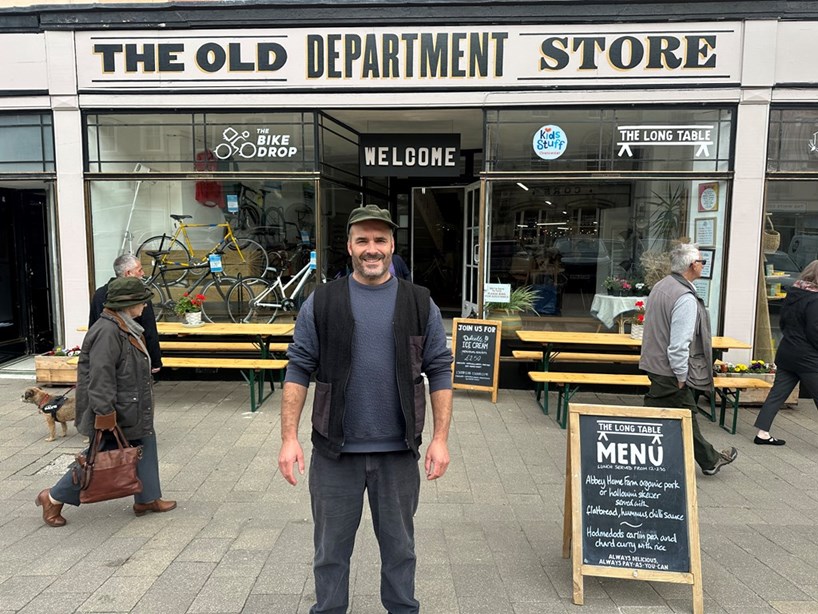 Tom Herbert outside The Old Department Store, in Cirencester, one of The Long Table restaurant locations
Tom Herbert outside The Old Department Store, in Cirencester, one of The Long Table restaurant locations
Last year, at the behest of the diocese of Gloucester, the third hub opened in Cirencester, where the Grace Network now has a 15-year lease on a 25,000 square-foot former House of Fraser store, now called The Old Department Store, which had been empty for six years.
As at Brimscombe Mill, the centrepiece in Cirencester is The Long Table. The corners of the building are occupied by other social enterprises: a furniture-recycling business, the Home Remedy; Kids Stuff, which sells secondhand children’s items and provides family-friendly activities; and the Bike Drop, which offers new and refurbished bikes, expert repairs, and access to professional bike-mechanic training (Cytech Level 3).
A fourth hub has just opened in Bedminster, in south Bristol. “Moving at the speed of trust”, the Grace Network piloted it for three years before they signed the lease in August.
STROUD was famously the birthplace of Extinction Rebellion, and its radical if not riotous history goes back several centuries. Mr Herbert says that “whatever is in the water in Stroud” has informed the spirit of the Grace Network. “We are provocatively trying to influence how the economy works for those that have been left behind.”
The walls of both Brimscombe Mill and The Old Department Store are emblazoned with two key statements. One is based on the so-called “Nazareth manifesto” in Luke 4: “We exist to bring the following words to life in our community: to show the vulnerable that change is possible, to help free people who feel trapped, and tell the world a new way of living, to help free people from the things, systems and choices that oppress us and to proclaim a new start, a second chance at a good life.”
The other is a quotation from Dietrich Bonhoeffer: “We are not simply to bandage the wounds of victims beneath the wheel of injustice. We are to drive a spoke into the wheel itself.”
The Grace Network was formally established in 2015 and has been working with the diocese of Gloucester since 2019.
“If you asked me who was our spiritual guide, I would say Bishop Rachel [Treweek],” Mr Mansell says. “She doesn’t tell us what to do: she’s far more positive than that. We have a beautiful partnership with the diocese. It’s one of mutuality, not control.”
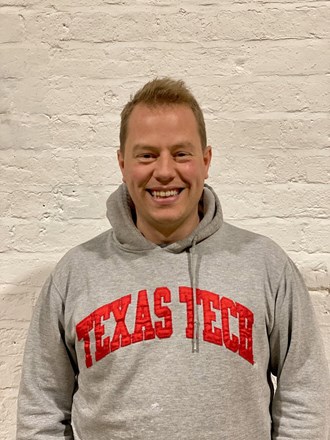 Will Mansell
Will Mansell
Christianity has quite a low profile in all their community hubs. “Some Evangelicals complain that we’re not Christian enough,” Mr Mansell says. “What most people notice when they come in is that, at our best, we feel safe, kind, welcoming, generous, optimistic. I think that’s why we don’t really discuss God much, because we don’t need to.”
Today, they employ about 150 people, Mr Mansell says, of whom maybe 15, “who identify ourselves as Jesus followers, would say we are part of the Order of Grace, which is a Bishop’s Mission Order with the diocese of Gloucester. We have a rule of life, with four commitments in our daily activity: hospitality, presence, justice, and prayer.
“In theological terms, we would be a pioneering Kingdom enterprise. [But] I could become a Muslim and still run this place; I could be a Hindu and run the place, or a Jew. There’s no legal need to be a Christian, but we’re built intrinsically on the message of the Good News, which is: ‘What if we loved our neighbours as we love ourselves?’”
The monastic framework to the Grace Network was inspired by Canon Dr George Lings’ book Seven Sacred Spaces: Portals to deeper community life in Christ (BRF 2020), which argues that all monastic communities, ancient and modern, have the same seven spaces or functions.
“‘Monastery’ isn’t just a noun, it’s a verb,” Mr Mansell insists, “and if human beings do those seven things regularly, amazing things happen.”
The first of these, he explains, is “the retreat space. In monastic terms, it’s the cell, but some of our colleagues have been to prison, so we renamed it. It’s where you go by yourself, or maybe with a trusted friend, to pray or do some meditation.
“What we call ‘the sanctuary’ is the space where we come together to think about things bigger than ourselves. You might do a eucharist service, if you were a Christian, or you might come and hear Corinne Bailey Rae sing (as she has at the Mill), or [the economist] Kate Raworth talk about the circular economy.
“The library is where you learn together. We provide lots of different training, for customers and staff.
“The chapter house is where the monks would come together to solve the community’s problems. For us, this is about communicating what we’re doing and why, bringing transparency to the whole operation.
“Fifth is the refectory. So, in Cirencester today the first half-an-hour of the day for our staff was spent eating breakfast together.
“The sixth space is the garden, where the monks used to work. For us, that is our businesses.
“The final space is the cloister, the place where human beings come and go. Physically, that is a big open space in our buildings where you bump into all sorts of people. Emotionally, it’s about keeping our doors always open.”
These seven spaces, Mr Mansell says, sum up the Grace Network’s approach to building community. “The enterprises we run are only one-seventh of our magic power. The other six places are also really important.”
thelongtableonline.com
thegracenetwork.org.uk
theolddepartmentstore.co.uk

